The organic hemp market is estimated to be valued at USD 187.7 million in 2025 and is projected to reach USD 660.3 million by 2035, registering a compound annual growth rate (CAGR) of 13.4% over the forecast period. A Year-on-Year (YoY) growth analysis reveals steady acceleration throughout the forecast period. Between 2025 and 2030, the market grows from USD 187.7 million to USD 352.1 million, contributing USD 164.4 million in growth, with a CAGR of 13.4%. This early-phase growth is driven by increasing consumer demand for organic hemp products, particularly in the health and wellness sector, as awareness of the benefits of CBD, dietary supplements, and natural remedies continues to rise. As the market expands, demand for hemp-based products such as oils, textiles, and food ingredients also increases.
From 2030 to 2035, the market continues to grow from USD 352.1 million to USD 660.3 million, contributing USD 308.2 million in growth, with a slightly higher CAGR of 14.2%. The latter-phase acceleration is fueled by broader adoption of organic hemp in diverse industries, including cosmetics, pharmaceuticals, and sustainable packaging. The continued shift toward natural and plant-based ingredients, along with the rising focus on eco-friendly and sustainable practices, further drives this demand. The YoY growth analysis shows strong growth during both early and late stages, underscoring the increasing penetration of organic hemp products into mainstream markets.
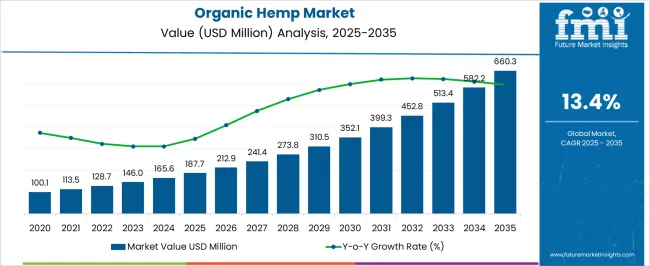
| Metric | Value |
|---|---|
| Organic Hemp Market Estimated Value in (2025 E) | USD 187.7 million |
| Organic Hemp Market Forecast Value in (2035 F) | USD 660.3 million |
| Forecast CAGR (2025 to 2035) | 13.4% |
The demand for organic hemp has been shaped by its nutritional benefits, environmental sustainability, and versatility across various applications. The market outlook appears optimistic as regulatory frameworks continue to evolve in favor of hemp-based agriculture and product development.
Increased acceptance of hemp in health foods, personal care, textiles, and industrial applications has further propelled its adoption across global markets. In agricultural industry bulletins and investor briefings, there has been consistent emphasis on improved yield practices, growing land allocation for hemp cultivation, and government support for organic farming.
The push towards carbon-neutral supply chains and eco-conscious sourcing strategies has positioned organic hemp as a key raw material in sustainable product lines As companies expand product portfolios to align with wellness and ethical sourcing trends, organic hemp is expected to play an increasingly central role in the future of functional foods and bio-based consumer goods.
The organic hemp market is segmented by distribution channel, application, and geographic regions. By distribution channel, the organic hemp market is divided into Indirect and Direct. In terms of application, the organic hemp market is classified into Hemp Seed, Hemp Fiber, Hemp Shives, and Hemp Dust. Regionally, the organic hemp industry is classified into North America, Latin America, Western Europe, Eastern Europe, Balkan & Baltic Countries, Russia & Belarus, Central Asia, East Asia, South Asia & Pacific, and the Middle East & Africa.
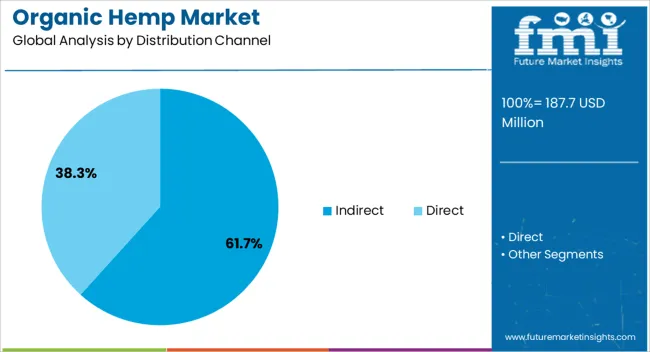
The indirect distribution channel is anticipated to account for 61.7% of the Organic Hemp market revenue share in 2025, positioning it as the dominant mode of distribution. This leadership has been reinforced by the extensive reach of third-party retailers, specialty stores, and e-commerce platforms, which have played a crucial role in expanding consumer access to organic hemp products.
In retail-focused industry reports and investor presentations, indirect distribution has been highlighted for its ability to deliver product education, shelf visibility, and bundling strategies that enhance consumer engagement. Organic and natural product retailers have strategically promoted hemp-based items as part of wellness categories, creating stronger brand affinity and recurring purchases.
Online distribution, in particular, has driven growth by enabling direct-to-consumer campaigns and broad geographic coverage without the constraints of physical retail This channel’s ability to deliver scale, marketing visibility, and operational efficiency has played a significant role in shaping its continued dominance in the overall market.
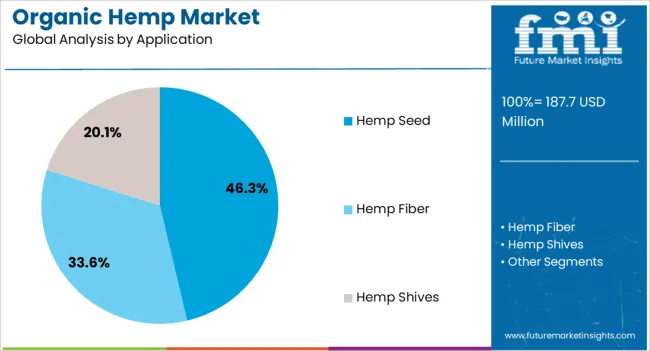
The hemp seed application segment is projected to command 46.3% of the Organic Hemp market revenue share in 2025, making it the leading application area. This leadership has been supported by growing consumer demand for high-protein, nutrient-rich superfoods and functional ingredients. As noted in food innovation forums and product press releases, hemp seeds are increasingly recognized for their omega fatty acids, fiber content, and digestibility, which have made them a preferred component in plant-based diets.
The use of hemp seeds in protein powders, dairy alternatives, nutrition bars, and baked goods has expanded significantly, especially in wellness-driven consumer segments. In industry publications, it has been emphasized that the shift towards clean-label and allergen-free formulations has further supported the adoption of hemp seeds in both premium and mass-market product lines.
Their compatibility with organic certification standards and sustainability claims has also contributed to increased penetration in health-focused retail environments These factors have collectively driven the hemp seed segment’s prominent share within the overall market.
The organic hemp market is experiencing growth due to the increasing demand for natural and eco-friendly products across various industries, including food, beverages, cosmetics, and textiles. Organic hemp is widely used for its nutritional benefits, particularly in the form of hemp seeds, oil, and protein, due to their high content of essential fatty acids, proteins, and fiber. The rise in health-conscious consumers, alongside the growing popularity of plant-based diets and natural beauty products, is driving the market forward. However, challenges related to regulatory standards, farming practices, and market education remain.
The organic hemp market is primarily driven by the growing demand for plant-based and natural products, especially in the food and beverage, personal care, and textile industries. Hemp products, such as hemp oil, seeds, and protein, are recognized for their nutritional benefits, including being rich in omega-3 fatty acids, protein, and fiber. The increasing shift towards plant-based diets, coupled with the rise of organic and clean-label trends, is fueling demand for organic hemp-based products. Hemp is viewed as an eco-friendly and sustainable crop, appealing to consumers seeking alternatives to products derived from synthetic or animal-based sources. As consumers become more health-conscious and seek out natural wellness solutions, organic hemp is gaining traction as a versatile and nutritious ingredient. Furthermore, the growing popularity of hemp-based textiles, skincare products, and dietary supplements is expanding the market's reach.
A significant challenge in the organic hemp market is the complex regulatory landscape surrounding hemp cultivation and processing. Although hemp has been legalized in many regions, regulatory frameworks regarding its cultivation, production, and sale remain inconsistent across countries, creating uncertainty for businesses. In some regions, the process of certifying hemp as "organic" can be complex and time-consuming, limiting market growth. The hemp supply chain faces limitations, including the availability of raw materials, processing capacity, and quality control issues. Inadequate infrastructure and inconsistent product standards can create barriers for smaller players to enter the market. There are challenges related to educating consumers about the benefits of organic hemp, as misinformation and confusion about the differences between hemp and marijuana can create hesitations in product adoption.
The organic hemp market presents significant opportunities for growth, especially in emerging markets. As the demand for organic products increases in regions like Asia-Pacific, Latin America, and Africa, the potential for hemp cultivation and production in these areas expands. These markets provide opportunities for hemp farming and processing to become a key agricultural industry, especially as demand for sustainable and plant-based products grows globally. Product innovation is driving market expansion. Companies are developing new hemp-based products in food, beverages, cosmetics, textiles, and even pharmaceuticals. The increasing popularity of CBD-based products, which are derived from hemp, is opening new revenue streams. The use of hemp in various industries, such as biodegradable packaging, further creates new market opportunities. As the hemp industry evolves, innovation in processing technologies, consumer education, and product development will be crucial for capturing new market share.
A key trend in the organic hemp market is the rise of hemp-based consumer goods, including food, beverages, personal care products, and textiles. Hemp seeds, oil, and protein are increasingly being incorporated into products such as energy bars, snacks, dairy alternatives, skincare items, and even biodegradable packaging. Additionally, the integration of CBD (cannabidiol) into wellness and health products has become a significant driver of market growth. CBD, extracted from hemp, is used in skincare, pain relief products, and dietary supplements due to its potential health benefits. As consumer interest in CBD-infused products rises, hemp's role as a key ingredient continues to expand. The emphasis on organic and clean-label products aligns with the demand for hemp, which is perceived as a natural and eco-friendly alternative to traditional ingredients. These trends are shaping the future of the organic hemp market, creating new product categories and expanding consumer awareness.
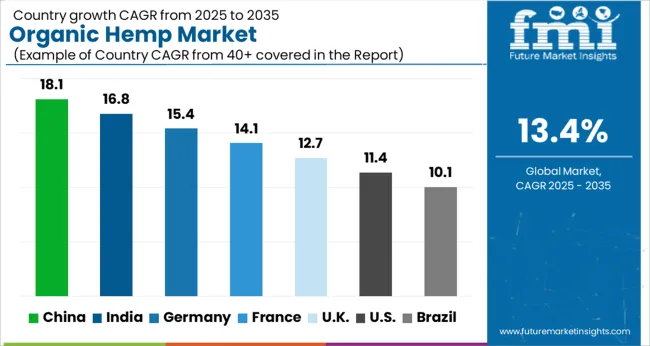
The global organic hemp market is projected to grow at a CAGR of 13.4% from 2025 to 2035. China leads at 18.1%, followed by India at 16.8%, and Germany at 15.4%, while the United Kingdom records 12.7% and the United States posts 11.4%. The growing adoption of organic hemp products in the health, wellness, and consumer goods industries in China and India, while more mature markets like the United States and the United Kingdom experience more moderate growth due to established infrastructure. The analysis includes over 40+ countries, with the leading markets detailed below.
China is expected to dominate the organic hemp market, growing at an 18.1% CAGR through 2035. The country’s vast agricultural base and increasing focus on organic farming are driving the adoption of organic hemp production. China is investing in hemp cultivation and processing facilities, expanding its presence in the global market. The demand for hemp-based products is also increasing in industries such as textiles, food, and health supplements. The government's favorable policies and growing export potential are further boosting the organic hemp market in China. With the country’s large population and increasing health-conscious consumers, the market is set to continue its rapid growth.
India is projected to grow at a 16.8% CAGR through 2035 in the organic hemp market. The country’s focus on sustainable agriculture and growing interest in health and wellness are driving the demand for organic hemp. India’s favorable climate conditions for hemp cultivation make it an ideal location for large-scale production. The market for hemp-based products in food, beverages, and cosmetics is also expanding rapidly. The Indian government’s efforts to promote organic farming and hemp cultivation, alongside increasing investments in processing infrastructure, are further accelerating market growth. The export potential of hemp products is contributing to India’s rising prominence in the global organic hemp market.
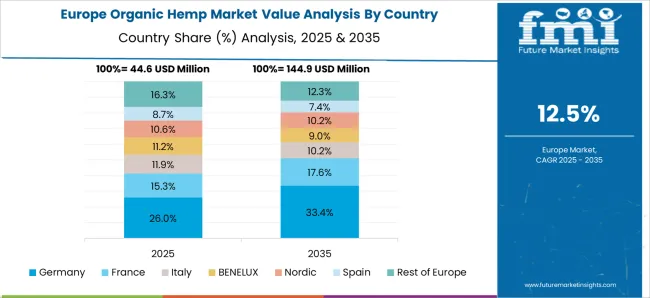
Germany is expected to grow at a 15.4% CAGR through 2035, driven by the rising demand for organic hemp products in food, personal care, and textiles. Germany’s strong commitment to sustainability and organic farming is driving the market for organic hemp. The country is investing in the research and development of hemp-based products, which is fueling innovation in the market. German consumers’ increasing preference for eco-friendly and natural products is also contributing to the market’s growth. Furthermore, Germany’s role as a key player in the European market is enhancing its export capabilities, making it one of the largest consumers and producers of organic hemp in the region.
The UK is projected to grow at a 12.7% CAGR through 2035, supported by the rising demand for hemp-based products in health supplements, food, and textiles. The increasing focus on sustainable and organic products, combined with growing consumer awareness about health benefits, is driving the market in the UK The country’s regulatory support for organic farming and the expansion of hemp cultivation are accelerating production. The UK’s well-established distribution networks and growing exports of organic hemp products are pushing the market forward. The rising demand for sustainable alternatives in various industries is also contributing to the market’s growth.
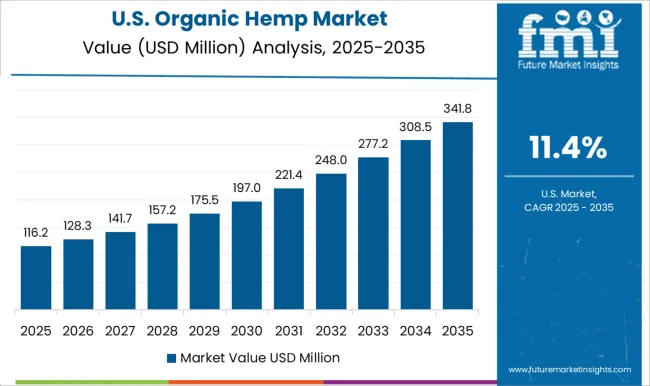
The United States is projected to grow at a 11.4% CAGR through 2035. The growing demand for organic hemp in industries like food and beverages, personal care, and textiles is driving market growth. With increasing consumer preference for plant-based products and sustainable alternatives, the USA market for hemp-based products is expanding rapidly. The country is investing in research and development for hemp cultivation and processing, which is expected to boost market growth. The rising legalization of hemp and its derivatives across various states has also contributed to a surge in organic hemp cultivation and production. The USA is also emerging as a key exporter of hemp products.
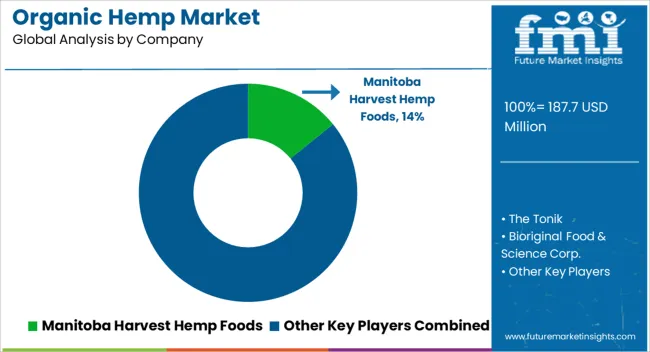
Suppliers of seed, oil, protein, and botanical extracts for food, beverage, personal care, and formulations have accelerated organic hemp adoption. Manitoba Harvest supplies organic hemp seeds, hearts, protein powders, and oils used across retail and B2B channels. The Tonik focuses on organic hemp seed oil capsules for nutrition-focused consumers. Bioriginal delivers organic hemp seed oil, protein, and turnkey formats for brands in food, beverage, and nutraceuticals. Organicway provides organic hemp oil and ingredients serving personal care and dietary uses. Connoils supplies organic hemp seed oil and oil powders with custom formulation support. Linwoods offers milled hemp seed and blends positioned for daily nutrition.
Qemp Zero Peppermint addresses THC-free preferences with hemp seed oil products. Pocono Organics operates a regenerative organic hemp program with CBD tinctures and topicals. Lotus Organics Plus markets hemp seed oil skincare ranges. Kemin Industries supports brand owners with organic hemp distillates for finished product development. Demand is supported by cleaner label positioning, omega-rich nutrition, and retail distribution, while formulation know-how around taste, stability, and compliant labeling remains a decisive differentiator.
| Item | Value |
|---|---|
| Quantitative Units | USD 187.7 Million |
| Distribution Channel | Indirect and Direct |
| Application | Hemp Seed, Hemp Fiber, Hemp Shives, and Hemp Dust |
| Regions Covered | North America, Europe, Asia-Pacific, Latin America, Middle East & Africa |
| Country Covered | United States, Canada, Germany, France, United Kingdom, China, Japan, India, Brazil, South Africa |
| Key Companies Profiled | Manitoba Harvest Hemp Foods, THE TONIK, Bioriginal Food & Science Corp., Organicway Inc., Connoils LLC, Linwoods, Pocono Organics, Lotus Organics+, Kemin Industries |
| Additional Attributes | Dollar sales by product type (hemp seeds, hemp oil, hemp protein, hemp extracts) and end-use segments (food and beverage, cosmetics, nutraceuticals, personal care). Demand dynamics are influenced by the rising consumer preference for organic, plant-based products, growing awareness of hemp's health benefits, and increasing adoption of hemp-based products in functional foods and natural beauty products. Regional trends show strong growth in North America and Europe, driven by regulatory changes supporting hemp cultivation and product innovation, while Asia-Pacific is expanding due to increasing interest in plant-based and sustainable ingredients. |
The global organic hemp market is estimated to be valued at USD 187.7 million in 2025.
The market size for the organic hemp market is projected to reach USD 660.3 million by 2035.
The organic hemp market is expected to grow at a 13.4% CAGR between 2025 and 2035.
The key product types in organic hemp market are indirect and direct.
In terms of application, hemp seed segment to command 46.3% share in the organic hemp market in 2025.






Full Research Suite comprises of:
Market outlook & trends analysis
Interviews & case studies
Strategic recommendations
Vendor profiles & capabilities analysis
5-year forecasts
8 regions and 60+ country-level data splits
Market segment data splits
12 months of continuous data updates
DELIVERED AS:
PDF EXCEL ONLINE
Organic Salad Dressing Market Forecast and Outlook 2025 to 2035
Organic Fertilizer Market Size and Share Forecast Outlook 2025 to 2035
Organic Acai Juice Market Size and Share Forecast Outlook 2025 to 2035
Organic Beverages Market Size and Share Forecast Outlook 2025 to 2035
Organic Drinks Market Size and Share Forecast Outlook 2025 to 2035
Organic Oats Market Size and Share Forecast Outlook 2025 to 2035
Organic Dried Distillers Grain Feed Market Size and Share Forecast Outlook 2025 to 2035
Organic Electronics Market Size and Share Forecast Outlook 2025 to 2035
Organic Dyes Market Size and Share Forecast Outlook 2025 to 2035
Organic Rankine Cycle Market Size and Share Forecast Outlook 2025 to 2035
Organic Seed Varieties Market Size and Share Forecast Outlook 2025 to 2035
Organic Lamb Market Size and Share Forecast Outlook 2025 to 2035
Organic Snack Food Market Size and Share Forecast Outlook 2025 to 2035
Organic Rice Protein Market Size and Share Forecast Outlook 2025 to 2035
Organic Hydrosols Market Size and Share Forecast Outlook 2025 to 2035
Organic Trace Minerals Market Analysis - Size, Share, and Forecast Outlook 2025 to 2035
Organic Food and Beverage Market Analysis - Size, Share, and Forecast Outlook 2025 to 2035
Organic Starch Market - Size, Share, and Forecast Outlook 2025 to 2035
Organic Fruit Powder Market Size, Growth, and Forecast for 2025 to 2035
Organic Condiments Market Size, Growth, and Forecast for 2025 to 2035

Thank you!
You will receive an email from our Business Development Manager. Please be sure to check your SPAM/JUNK folder too.
Chat With
MaRIA